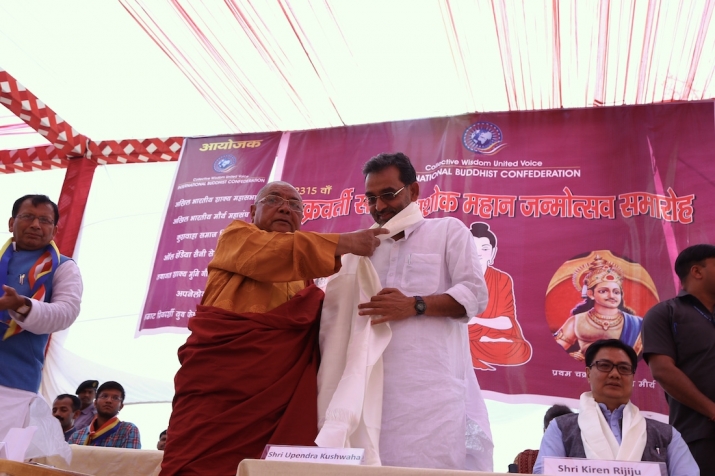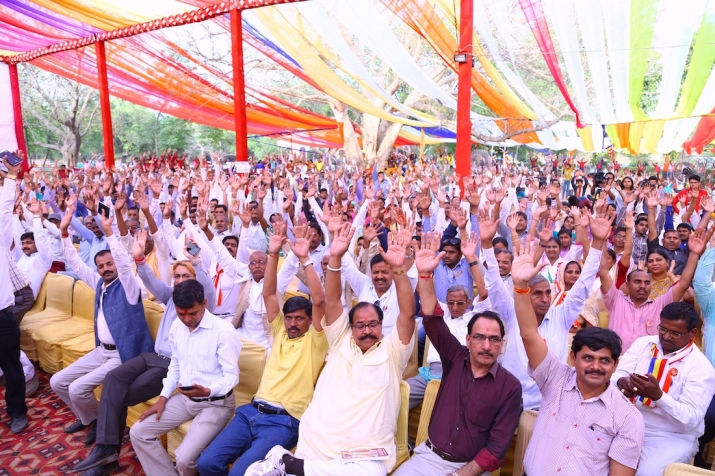NEWS
IBC Marks Birth Anniversary of Emperor Ashoka
 IBC Secretary General Ven. Lama Lobzang welcomes Shri Upendra Kushwaha, India’s minister of state for human resource development. Image courtesy of IBC
IBC Secretary General Ven. Lama Lobzang welcomes Shri Upendra Kushwaha, India’s minister of state for human resource development. Image courtesy of IBCTo mark the birth anniversary of the Mauryan emperor Ashoka the Great, a memorial celebration titled “Chakravarti Samrat Ashok Mahan Janmotsav” was held on 14 April at the Asoka Mission, New Delhi, organized by the International Buddhist Confederation (IBC), Akhil Bhartiya Shakya Mahasabha, Akhil Bhartiya Maurya Mahasangh, Kushwaha Samaj Delhi, All India Saini Sewa Samaj, Tathagat Shakyamuni Gautam Buddha Sanstha, Apne Log, and the Samrat Priyadarshi Youth Federation of India.
Ashoka (r. c. 268–c. 232 BCE) is among the most influential figures in India’s history and culture, and is the only known ruler in history to have given up warfare despite being victorious in the battlefield. Although he adopted the Buddha Dharma following the Kalinga War (c. 262–c. 261 BCE), he continued to respect all religions equally. In his edicts, Ashoka expressed support for all the major religions of his time, namely Buddhism, Brahmanism, Jainism, and Ajivikaism. His edicts were addressed to all his subjects, regardless of the religion they professed, and generally focused on moral themes that followers of all the religions would accept. Ashoka was the embodiment of compassion; according to several accounts he banned animal slaughter in his empire, and encouraged vegetarianism.
Ashoka may be credited with ensuring the status of Buddhism as one of the great religions of the world. Without him the eternal teachings of the historical Buddha might have remained confined to the Gangetic valley and the plains of northern India. He sent his daughter Sanghamitra and son Mahindra to spread the Dhamma in what is present-day Sri Lanka. He sent bhikshus to disseminate the teachings of the Buddha in the regions that today constitute Afghanistan, Egypt, Greece, Iran, Italy, Syria, and Turkey in the west, Bhutan, China, Mongolia, and Nepal in the north, and Cambodia, Laos, Myanmar, Thailand, and Vietnam in the east. He also dispatched messengers to propagate the Dhamma in other parts of India, namely in present-day Kashmir and Maharashtra, and in large parts of southern India.
Ashoka is a national icon in India. The highest peacetime gallantry award given to members of the Indian Armed Forces is known as the Ashoka Chakra. All major symbols of India’s governance contain icons related to Ashoka. The Emblem of India, adopted on 26 January 1950, the day that India became a republic, is an adaptation of the Ashoka Lion Capital that is now preserved in Sarnath Museum. The four Asiatic lions, standing back to back, symbolize power, courage, pride, and confidence. The emblem is inscribed on all official documents of the Government of India, and appears on all Indian currency and passports. The Ashoka Chakra (Ashoka Wheel), a 24-spoke wheel on its base, features in the center of the national flag of India.
 Resolution to petition the Indian government to mark the birth anniversary of Ashoka with a national holiday receives a unanimous vote. Image courtesy of IBC
Resolution to petition the Indian government to mark the birth anniversary of Ashoka with a national holiday receives a unanimous vote. Image courtesy of IBCAt the end of the day-long celebration, in order to honor Ashoka’s immense contribution to humankind and Indian culture, and his influence, which has extended far beyond the borders of India, a unanimous resolution was adopted to request the Government of India to facilitate the observance of this historic day as an annual national public holiday.
The 14 April celebration was attended by more than 2,000 members of the Shakya and Maurya communities, which trace their origins to the Shakya clan of Shakyamuni Buddha and the Maurya clan of Ashoka, respectively. Indian Minister of State for Human Resource Development Upendra Kushwaha was the chief guest and Union Minister of State for Home Affairs Kiren Rijiju was guest of honour. Members of parliament and senior diplomats from Sri Lanka, Taiwan, and Mongolia also attended.
See more














